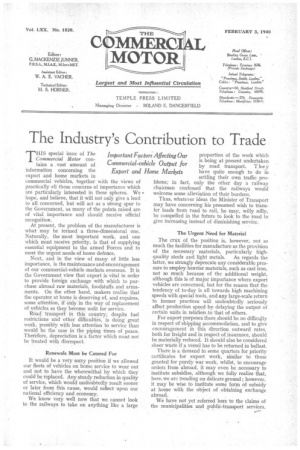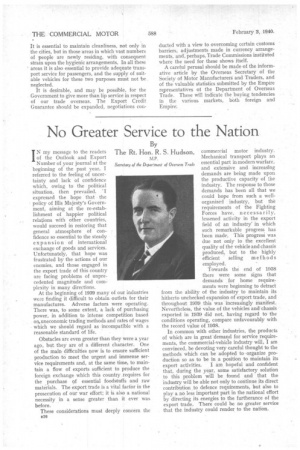The Industry's Contribution to Trade
Page 45

Page 46

If you've noticed an error in this article please click here to report it so we can fix it.
THIS special issue of The Commercial Motor con tains a vast amount of information concerning the export and home markets in commercial vehicles, together with the views of practically all those concerns of importance which are particularly interested in these spheres. We 1 hope, and believe, that it will not only give a lead to all concerned, but will act as a strong spur to the Government, as many of the points raised are of vital importance and should receive official recognition.
At present, the problem of the manufacturer is what may be termed a three-dimensional one. Naturally, the most important work, and one which must receive priority, is that of supplying essential equipment to the armed Forces and to meet the urgent needs of home defence.
Next, and in the view of many of little less importance, is the maintenance and encouragement of our commercial-vehicle markets overseas. It is the Government view that export is vital in order to provide foreign exchange with which to purchase abroad raw materials, foodstuffs and armaments. On the other hand, makers realize that the operator at home is deserving of, and requires, some attention, if only in the way of replacement of vehicles as they become unfit for service.
Rbad transport in this country; despite fuel restrictions and other difficulties, is doing great work, possibly with less attention to service than would be the case in the piping times of peace. Therefore, depreciation is a factor which must not be treated with disrespect.
Renewals Must be Catered For It would be a very sorry position if we allowed our fleets of vehicles on home service to wear out and not to have the wherewithal by which they could be replaced. Any steady reduction in quality of service, which would undoubtedly result sooner or later from this cause, would reflect upon our national efficiency and economy.
We know very well now that we cannot look to the railways to take on anything like a large proportion of the work which is being at present undertaken by road transport. T h.e y have quite enough to do in settling their own traffic problems; in fact, only the other day a railway chairman confessed that the railways would welcome some alleviation of their burdens.
Thus, whatever ideas the Minister of Transport may have concerning his presumed wish to transfer loads from road to rail, he may, willy nilly, be compelled in the future to look to the road to give increasing instead of diminishing service, The Urgent Need for Material The crux of the position is, however, not so much the facilities for manufacture as the provision of the necessary materials, particularly high quality steels and light metals. As regards the latter, we strongly deprecate any considerable pressure to employ heavier materials, such as cast iron, not so much because of the additional weight, although this is of major importance where export vehicles are concerned, but for the reason that the tendency of to-day is all towards high machining speeds with special tools, and any large-scale return to former practices will undoubtedly seriously affect production speed-by delaying the output of certain units in relation to that of others.
For export purposes there, shonld be no difficillty in respect of shipping accommodation, and to give encouragement in this direction outward rates, both for freight and in respect of insurance, should be materially reduced. It should also be considered sheer waste if a vessel has to be returned in ballast.
There is a demand in some quarters for priority certificates for export work, similar to those granted for purely war work, whilst, to encourage orders from abroad, it may even be necessary to institute subsidies, although we fully realize that, here, we are treading on delicate ground ; however, it may be wise to institute some form of subsidy at home with the object of obtaining exchange abroad.
We have not yet referred here to the claims of the municipalities and public-transport services. It is essential to maintain cleanliness, not only in the cities, but in those areas in which vast numbers of people are newly residing, with consequent strain upon the hygienic arrangements. In all these areas it is also essential to provide adequate transport service for passengers, and the supply of suitable vehicles for these two purposes must not 'be neglected.
It is desirable, and may be possible, for the Government to give more than lip service in respect of our trade overseas. The Export Credit Guarantee should be expanded, negotiations con ducted with a view to overcoming certain customs barriers, adjustments made in currency arrangements, and, perhaps, Trade Commissions instituted where the need for these shows itself.
A careful perusal should be made of the informative article by the Overseas Secretary of the Society of Motor Manufacturers and Traders, and of the valuable statistics submitted by the Empire representatives ot the Department of Overseas Trade. These will indicate the buying tendencies in the various markets, bath foreign and Empire-.








































































































